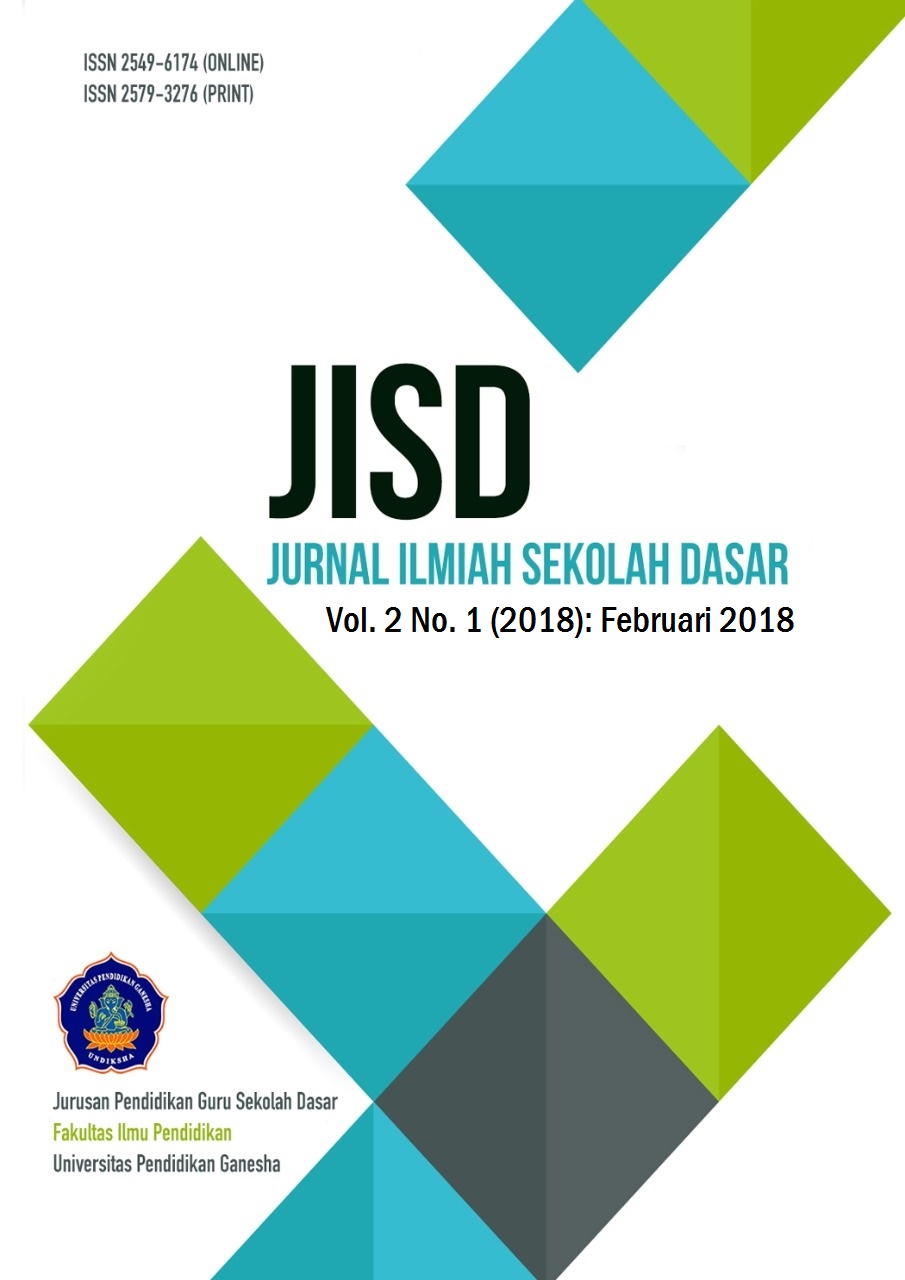Implementasi Model Pembelajaran Problem Solving Untuk Meningkatkan Motivasi Belajar Dan Hasil Belajar Pkn Siswa
DOI:
https://doi.org/10.23887/jisd.v2i1.13893Abstract
This study aims to ( 1 ) increase students' motivation to learn civics and ( 2 ) improving student learning outcomes of the implementation of civic education learning model of Problem Solving in learning civics . The subjects were VI grade students of SD Negeri 6 Tianyar in the second semester of academic year 2016/2017 , amounting to 35 men with 20 men and 15 women . This research was conducted in two cycles of learning with the stages in each cycle includes planning , action , observation / evaluation , and reflection . The data were collected by the method of student motivation questionnaire and student learning outcomes data collected through charging student worksheets ( LKS ) , tasks, quizzes , and a final test cycle . The collected data were then analyzed descriptively . Results showed ( 1 ) an increase in the average score of student learning moivasi at 87.80 on the first cycle and the second cycle increased to 92.74 , ( 2 ) an increase in civics student learning outcomes in the first cycle was 76.8 with complete categories and on the second cycle increased to 80.7 with complete categories.References
Arikunto, S. 2004. Dasar-dasar evaluasi pendidikan (Edisi revisi). Jakarta: Bumi Aksara.
Carson, J. 2007. A problem with problem solving: Teaching thinking without teaching knowledge. The Mathematic Educator. 17(2). 7-14. Tersedia pada http//www.v17n2.org/carson.pdf. Diakses pada tanggal 17 November 2011.
Costu, B., Ayas, A., & Niaz, M. 2010. Promoting conceptual change in first year students understanding of evaporation. Journal Chemistry Education Research and Practice, 11, 5-16. Diakses tanggal 3 September 2011 dari http://www.rsc.org cerp.
Dahar, R. W. 1989. Teori-teori belajar. Jakarta: Erlangga.
Gok, T. & Silay, I. 2010. The effects of problem solving strategies on students’ achievement, attitude and motivation. Latin American Journal Physics of Education. 4(1). 7-21. Tersedia pada http//www.journal.lapen.org.mx. Diakses pada tanggal 26 Juli 2011.
Hamzah, B. U. 2008. Teori motivasi dan pengukurannya. Jakarta: Bumi Aksara.
Hergenhann, B. R. & Olson, M. H. 2009. Theories of learning (terjemahan). Jakarta: Kencana Prenada media Group.
Jihad, A., & Haris, A. 2008. Evaluasi pendidikan. Jakarta: Multi Presindo.
Litzinger, T. A., VanMeter, P., Firetto, C. M., Passmore, L. J., Masters, C. B., Turns, S. R., Gray, G. L., Costanzo, & F. Zappe, S. E. 2010. A cognitive study of problem solving in statics. Journal of Engineering Education. 2(2). 337-353. Tersedia pada http//www. engconfintl. org. Diakses pada tanggal 9 April 2011.
Malik, M. A. & Iqbal, M. Z. 2011. Effects of problem solving teaching strategy on problem solving and reasoning ability of 8th graders. International Journal of Academic Research. 3(5). 91-84. Tersedia pada http// www. ijar. lit.az. Diakses pada tanggal 18 Oktober 2011.
Nurkancana, W., & Sunartana, P.P.N. 1990. Evaluasi hasil belajar. Surabaya: Penerbit Usaha Nasional.
Paton, R. 2010. Making problem-solving in engineering-mechanics visible to first-year engineering students. Australian Journal of Engineering Education. 16(2). 123-138. Tersedia pada http// www.engineersmedia. com.au/ AJEE_16_2. Diakses pada tanggal 9 April 2011.
Permendiknas No.22 Tahun 2006. Standar isi untuk pendidikan dasar dan menengah. Jakarta: Kemeterian Pendidikan Nasional.
Rohani, A. 2004. Pengelolaan pengajaran. Jakarta: Rineka Cipta
Santyasa, I W. 2004. Pengaruh model dan seting pembelajaran terhadap remidiasi miskonsepsi, pemahaman konsep dan hasil belajar fisika pada siswa SMU. Disertasi (tidak diterbitkan). Program Doktor Teknologi Pembelajaran Program Pascasarjana Universitas Negeri Malang.
Santyasa, I W. 2006. Pembelajaran inovatif: model kolaboratif, basis proyek, dan orientasi NOS. Makalah. Disajikan dalam Seminar di Sekolah Menengah Atas (SMA) Negeri 2 Semarapura Tanggal 27 Desember 2006, di Semarapura
Santyasa, I W. 2007. Model-model pembelajaran inovatif. Makalah. Disajikan dalam pelatihan tentang Penelitian Tindakan Kelas bagi Guru-Guru SMP dan SMA di Nusa Penida, tanggal 29 Juni s.d 1 Juli 2007.
Schunk, D. H. 2009. Learning teories: An educational perspective. Fifth Edition. USA: Pearson Prentice Hall
Suastra, I W. 2009. Pembelajaran sains terkini: Mendekatkan siswa dengan lingkungan alamiah dan sosial budaya. Singaraja: Universitas Pendidikan Ganesha.
Sudjana, N. 2005. Penilaian Hasil Proses Belajar. Bandung: PT Remaja Rosda Karya.
Suparno, P. 1997. Filsafat konstruktivisme dalam pendidikan. Yogyakarta: Kanisius.
Tao, P. K. 2001. Confronting student with multiple solution to qualitative physics problem. Physics Education. 37(2). 135 – 139. Tersedia pada http// www.iop.org/Journals/pe. Diakses pada tanggal 18 November 2011.
Downloads
Published
How to Cite
Issue
Section
License
Authors who publish with the Journal Ilmiah Sekolah Dasar agree to the following terms:
- Authors retain copyright and grant the journal the right of first publication with the work simultaneously licensed under a Creative Commons Attribution License (CC BY-SA 4.0) that allows others to share the work with an acknowledgment of the work's authorship and initial publication in this journal.
- Authors are able to enter into separate, additional contractual arrangements for the non-exclusive distribution of the journal's published version of the work (e.g., post it to an institutional repository or publish it in a book), with an acknowledgment of its initial publication in this journal.
- Authors are permitted and encouraged to post their work online (e.g., in institutional repositories or on their website) prior to and during the submission process, as it can lead to productive exchanges, as well as earlier and greater citation of published work. (See The Effect of Open Access)










